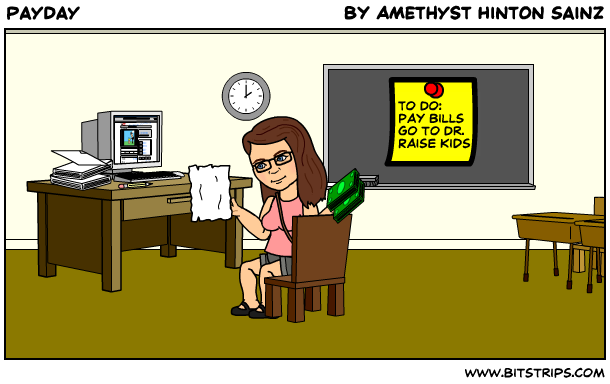A year in a new position kept me on my toes, but overall my morale this year is very good. I could name five or six major factors that have increased my morale this year. Reason #1, though? Salary. I earn approximately 25% more here in Tempe, Arizona, than I did in Tucson. How is this possible? Simply by moving, within the same state, my 1.0 FTE position pays 25% more? I am the beneficiary of, I’m sure, several forms of school funding inequity that have kept my colleagues in my Tucson district without raises for the past six years. The intricacies of these formulas are beyond my current understanding. If you know someone I can interview on the issue, send me their contact information.
So, how have I spent my extra pay? Have I frittered it away on fancy coffee? Have I taken to weekly massages? How is this extra money increasing my morale?
For starters, I can pay my debts. I can cover auto repairs and unexpected trips to the doctor. In fact, there was more than one unexpected hospitalization, and even major emergency dental work, in our family this school year. With my new salary I knew that we could pay these bills off within a reasonable amount of time.
We can also have a bit of a lifestyle. I can sign my children up for summer musical theater and engineering classes without asking for special “scholarships” to cover registration fees and uniforms. I can buy camping equipment and leave town without special planning for the cost of an extra tank of gas. I can hire a babysitter from time to time. I can even afford to get a little help with housecleaning. I can tuck some away.
In addition to all of these benefits, I can buy special colored cardstock and a few extra books for my classroom without feeling like I am taking anything from my family.
That about covers the extra money I made this year, not counting the extra retirement contributions. How does all of this affect my teaching? Well, perhaps this is a bit cynical, or perhaps I’m willing to be a bit honest. After all, we teachers as a profession are working to shed the idea of a nunnish devotion to our students, especially when it is used to justify low salaries and the ongoing sacrifices asked of teachers when budgets crunch.
Here is the simple, honest truth: A higher salary affects my commitment to teaching because I feel that I am valued, and that the district needs me to do this work. When new administrative pressures come down, or I am asked to turn in or fine tune my written lesson plans, when I am asked to further standardize my curriculum, and when I am asked to pace my class toward the state test, all of these requirements seem more palatable. I am compensated more fairly for my work within this system, and my contributions to it. I recognize that the system is intensely flawed. So does this sound like I am selling out? I am undecided. At any rate, it doesn’t help me, my family or my students when I cannot cover my bills.
In my experience, at least at the secondary level, there is a strong maverick tendency within English departments. Perhaps this is also true in other content areas, but in English, I have often sensed that the majority of teachers feel like they must work as outsiders, trying to make an impossible system work somehow, in whatever individual way they feel committed to. Part of the reason for this common trend has not only been the isolating effects of traditional school culture and compartmentalization, but is strongly related to that intensely personal ownership that we take of our classrooms. And of course we have taken that ownership; if we didn’t personally own what happened in our classrooms, we certainly haven’t been paid enough to care, to really care, about what happened there, especially in terms of the time it takes to read and assess essays. Our paychecks haven’t shown us the worth of our work; we have had to remind ourselves how important it is. No wonder that there are so many self-righteous mavericks among us. In fact, someone needs to write a revolutionary book: The Teacherly Mystique. It is appealing in many ways, but is it keeping us down?
Perhaps, if more teachers are paid what they are worth, along with benefitting from other supports, we would not feel so marginalized. Perhaps we could use the energy of our radicalization to transform the system from within.










Comments 2
Amethyst — you touch on so many of the issues that face our decentralized approach to schooling. In many ways, teacher pay is something that may be better left at a state-level or with some basic levels for districts. The inequality in pay is certainly not an incentive for teachers to move to districts with lower pay scales and possibly more teaching responsibilities. Thank you for sharing this important issue.
Amethyst,
Bravo. You did a great job addressing an important issue. I’m so tired of feeling like this topic is off the table. Thanks for putting it back on.
-Eve